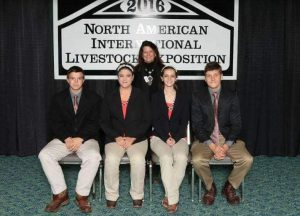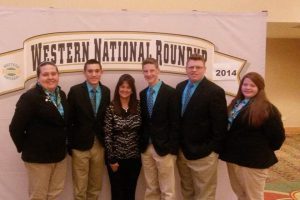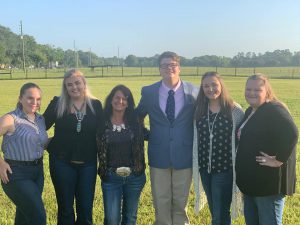What is Livestock Judging?
Livestock judging is the evaluation of an animal’s characteristics and making a comparison to other animals and the ideal standard of that particular class (Thayne, 2011). So, how do we evaluate animals and why do we evaluate them? Why has 4-H created contests for it? For farmers, crop and livestock evaluation is just part of everyday life, but for the public it is not. It falls to those in the ‘field’ to educate the public about where their agricultural commodities and by-products they use every day come from. Our 4-H youth are agricultural ambassadors to the public and they are and will continue to be consumers.
In the agricultural world, farmers need to have the best production animals possible. Highly productive animals are their livelihood. They look at animals to determine form and function. Certain breeds excel in certain areas – their characteristics make them ideal for a definite type of production. Nubian goats are excellent for dairy production while Boer goats are desirable meat goats because of their body shape, growth rate, fertility, and hardiness. Their form helps identify their function. In the world of rabbits, some are meat producers, like Flemish Giants, while others are used for wool, like Angoras. Jersey cows are raised for dairy production while Angus are raised for meat.
Let’s look even closer, using the goats as our example. Some Boers will be better meat producers than others. Some will be better for breeding purposes because of the genetics they will pass on. A farmer needs to know and monitor his stock closely to improve his herds. This may involve selective breeding within the herd, buying quality stock from other producers, or ordering artificial insemination equipment from supply companies.
4-H and Livestock Judging
Four-H youth completing livestock projects, from poultry to market steer, are learning how to differentiate those valuable characteristics too. For example, a youth evaluating a potential breeding doe for a herd would look for form: age, a well-formed udder with good attachment, depth of rib and appropriate length of body that indicate capacity, visually healthy reproductive organs, and other criteria. Being able to breed, and then to safely carry, birth, and care for healthy kids is the doe’s function.

Many 4-H’ers raise their own animals to increase their own herds, to sell at market auctions, or to have as a business. Of course, they all participate in livestock projects because they love animals. Helping them make the best decisions regarding their animals are their parents, club leaders and advisors, extension agents, research, and the show ring judges. In the show ring, a judge is looking at a breeding or market animal to determine which animals possess the best form to serve a function. The judge is trained to know what the animal is supposed to look like and judges each animal as it compares to that ideal – conformation. Our hearts swell when we see a small child cuddling her chicken. To the public it is a cute picture. But to that child, it is serious business. She knows which of her flock to enter in the show. She knows that the comb is correct, the feather structure and coloring is correct for the breed, and the animal is free from disqualifications. When she competes in showmanship, she will point out the healthiness and qualities of her poultry as a breeder or market animal to the judge.

2nd Place Florida 4-H
Contests are a way to teach youth to make educated choices about their animals. Volusia County 4-H’s teams, under the leadership of Livestock Judging Coach, Lori Smith, learn year round about determining what makes a quality animal. The 4-H agent asked Lori Smith, an Indiana 4-H alumna, teacher, and 4-H volunteer, to be the coach years ago, and Ms. Smith has gone above and beyond in that role. She says, “I’ve been asked why I volunteer to coach livestock judging. This is such an interesting question as the time needed to organize events, train, travel, and raise money for the trips can be overwhelming. The answer is simple . . .I believe in youth development and molding them into better individuals. I’ve seen how livestock judging gives children so many skills that they will use for the rest of their lives.” For the past several years, under Ms. Smith’s leadership, the Volusia County teams have traveled to many national contests representing Florida. This summer, Volusia was once again crowned state champions! This entitled them to represent Florida at the national contest held in Louisville, Kentucky, at the North American International Livestock Exposition (https://www.livestockexpo.org/). Unfortunately, due to the coronavirus pandemic, the event has been canceled.

How does livestock judging work as a contest? Most of it is months or years of preparation. The youth participate in contests around the state, meet regularly to study, and practice at every jackpot show or fair they attend. The Florida State Fair holds a contest and the state competition for FFA and 4-H is held in Gainesville at the University of Florida. One FFA team and one 4-H team of three or four senior youth (ages 14-18) from each county may compete. Four or five market classes (beef, swine, lamb, and/or goats); four or five breeding classes (beef, swine, and/or sheep); one keep/cull class with performance records (beef and/or swine consisting of eight animals) – team activity; and an evaluation class (feeder cattle, frame/muscle) are required. Youth must individually place a group of animals correctly, and as an added aspect to the contest, they must give oral reasons for some of their decisions.
Spotlight on the 2019 – 2020 Florida 4-H Champions!

For 2019-2020, the Volusia County 4-H team was made up of Caitlin Wise, Cheyann Wilkins, Tyler Watson, and Megan Christopher (with alternate Mckenna Burke). These remarkable young people all attend DeLand High School and belong to both 4-H and FFA. Each of them has shown livestock for many years and excel in the ring.
According to Caitlin Wise, “I learned how to properly evaluate an animal and select the best animal in terms of production and longevity. I have selected many animals on my own because of livestock judging and will continue to do so in the future. Livestock judging also helped me on my public speaking drastically. I’ve learned many life skills from livestock judging and I hope many other kids choose to join this very competitive community.”
Tyler Watson adds, “In livestock judging I have learned how to not only examine the faults but also the good things about that animal and paint a picture as to what they will look like when they are older, because just like humans, animals change as they grow up. So it’s always about the minor and major defects.”
Megan Christopher reports, “Livestock judging has helped me evaluate and sort through livestock that I’m choosing for my upcoming fairs and show season, and I would not have come as far as I have without my constant improvement in judging.”
Each of the youth credit Ms. Smith and their FFA advisor, Mr. Brandner, as well as their parents and other members of the 4-H family for motivating and educating them. As Tyler relates, “I wanted to do livestock judging to get more involved with 4-H and FFA. In 7th grade I attended my first meeting not knowing much. I soon started to learn and develop my skills with the help of my advisor Lori Smith. When I first judged an actual contest I was hooked.”
They have also formed strong bonds of friendship with their teammates, other youth around the state, as well as youth around the country while at camps, shows, and competitions. One of the best outcomes is that they all mentor younger youth. Caitlin says, “My future in ag is to coach and teach kids about the show stock community.” Tyler plans to use his experiences to help him pursue a degree in veterinary science. Megan hopes to attend college out west, be part of a collegiate livestock judging team, and study law, “Not only does livestock judging open doors for scholarships but it catches the eyes of colleges.”
All of the youth admit that livestock judging is difficult, challenging, and exhausting. But they do it year after year because they know they are learning valuable life skills like critical thinking, decision making, and teamwork (Targeting Life Skills). “A lot of people say if you love your job, you feel like you’re not working. I have a passion for livestock and I love to be involved in the livestock community. Because I showed livestock I was fond of livestock judging and I always wanted to improve in judging and the show ring.” – Caitlin Wise
Photos courtesy of Lori Smith, Volusia County 4-H Livestock Judging Coach
 0
0
